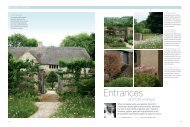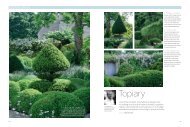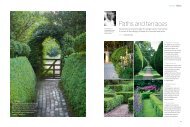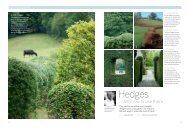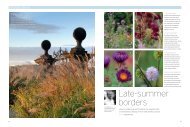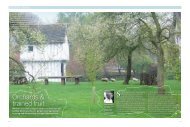Cottage garden style - Arne Maynard Garden Design
Cottage garden style - Arne Maynard Garden Design
Cottage garden style - Arne Maynard Garden Design
You also want an ePaper? Increase the reach of your titles
YUMPU automatically turns print PDFs into web optimized ePapers that Google loves.
DESIGN IDEAS<br />
1. Key plants<br />
Whether you mix bright colours or<br />
keep things muted, choosing the right<br />
plants is the key. Here self-seeded<br />
aquilegias combine with Geranium<br />
phaeum, astrantias and alliums in a<br />
subtle but dramatic colour palette<br />
of mauves, lilacs and clarets.<br />
<strong>Arne</strong> <strong>Maynard</strong> is a<br />
leading <strong>garden</strong> designer<br />
based in London and<br />
Monmouthshire<br />
<strong>Cottage</strong><br />
<strong>garden</strong> <strong>style</strong><br />
<strong>Cottage</strong> <strong>garden</strong>s are about practicality, good husbandry<br />
and pride in your growing skills. They’re also a wonderful<br />
opportunity for riotous and colourful planting<br />
WORDS ARNE MAYNARD<br />
2. The <strong>garden</strong> gate<br />
The entrance to a <strong>garden</strong> should<br />
give you a taste of what follows.<br />
This clipped beech arch and<br />
simple gate are entirely in<br />
keeping with the orderly path<br />
beyond, and its bordering<br />
cottage <strong>garden</strong> planting.<br />
3. Apple tree<br />
There’s often no room for more<br />
than one or two trees in a<br />
cottage <strong>garden</strong>, where space<br />
and light are needed for fruit,<br />
vegetables and flowers. A single<br />
apple or pear tree in the lawn<br />
looks and feels right, and offers<br />
a shady place to sit in summer.<br />
4. In plain view<br />
The essence of the cottage<br />
<strong>garden</strong> is its visibility, whether<br />
seen over a low wall, a hedge or,<br />
as here, through a transparent<br />
gate. Left ajar, the fact that<br />
this lovely reclaimed metal<br />
field gate has been allowed<br />
to go rusty downplays its<br />
decorative features.<br />
5. Made by hand<br />
<strong>Cottage</strong> <strong>garden</strong>s are personal<br />
spaces and often proclaim their<br />
individuality at the entrance.<br />
There is something incredibly<br />
appealing about this simple<br />
cleft gate, made with split<br />
timber planks of unequal<br />
size and the very opposite<br />
of anything machine-made.<br />
92 93<br />
GI175_DESIGN_Ideas_cottages_final_rev1.indd 92-93 18/8/11 18:29:02<br />
1 BRITT WILLOUGHBY DYER; 2 MARIANNE MAJERUS; 3 HOWARD RICE/ GAP PHOTOS, DESIGN BOB AND SUE FOULSER; 4 N&R COLBORN / GARDEN WORLD IMAGES; 5 LEE AVISON / GAP PHOTOS<br />
2 3<br />
4 5<br />
4
DESIGN IDEAS<br />
6. Reclaimed<br />
materials<br />
The cottage <strong>garden</strong> should<br />
be dominated by plants, with<br />
only a small amount of hard<br />
landscaping. Here, abundant<br />
planting spills on to a narrow<br />
path of loosely laid, reclaimed<br />
brick in which the joints have<br />
been left un-mortared to<br />
allow mosses to gather and<br />
plants to self-seed in true<br />
cottage-<strong>garden</strong> <strong>style</strong>.<br />
7. Beautiful balance<br />
A whole scramble of things<br />
grow in front of a lovely old<br />
timbered house that looks as<br />
though it has been this way<br />
forever. House and plants<br />
co-exist in harmony. Tidiness<br />
is not the point and the effect<br />
is achieved partly by choosing<br />
the right kind of roses for the<br />
purpose – this one is a<br />
vigorous climber.<br />
8. Working areas<br />
Produce is an essential part of<br />
the cottage <strong>garden</strong> ethos, and<br />
I’d put a plot for vegetables<br />
where it can be seen. Here<br />
practicality and ornament<br />
combine in a working area of<br />
the <strong>garden</strong>, with runner beans<br />
on metal arches framing a<br />
simple chipping path.<br />
My memories of growing up in a small<br />
village in Dorset in the late 1960s and<br />
1970s will always influence my idea<br />
of cottage <strong>garden</strong>s. For me, the cottage <strong>garden</strong> has<br />
a strong element of functionality. It doesn’t have<br />
structures or grand terraces, and space is often<br />
limited. The art of cottage <strong>garden</strong>ing was to get as<br />
much out of the area as possible, and to nourish<br />
the family. The people who made them were<br />
<strong>garden</strong>ers, and proud of their skills. There’d be<br />
amazing flowers, many grown for practical and<br />
medicinal as well as ornamental purposes. With<br />
the busy lives we lead today, I think this functionality<br />
is a beautiful principle to come back to, and<br />
6 7<br />
8 9<br />
it’s the heartbeat of a cottage <strong>garden</strong>: a place to<br />
grow vegetables and flowers all mixed in together.<br />
The <strong>garden</strong>s I remember – and the ones that<br />
still inspire me – used vernacular materials. They<br />
might have had a flint-and-brick wall in front, or<br />
a native hedge that was a bit bumpy and clipped<br />
growing on a raised bank. There might be a<br />
briar rose growing into the hedge, or apple<br />
trees growing out if it – a space-saving device<br />
so the tree would overhang the boundary on<br />
to the lane. On the verge there would be long<br />
grass with ox-eye daisies.<br />
These are the elements I draw on when I’m<br />
making a cottage <strong>garden</strong>, and I’ll often put an<br />
6 MARIANNE MAJERUS; 7 FAIZAN BALABIL / GARDEN WORLD IMAGES; 8 MARIANNE MAJERUS; 9 MAP/NATHALIE PASQUEL / GARDEN WORLD IMAGES<br />
apple tree to one side of the gate, so that you’re<br />
stooping down under the boughs to go in. It’s<br />
about reducing scale, because in a true cottage<br />
<strong>garden</strong> everything is crammed in.<br />
To one side of the path there might be a<br />
vegetable <strong>garden</strong>. Mixed in with the vegetables and<br />
fruit would be a few rows of sweet peas and, later,<br />
chrysanthemums, because these could be cut and<br />
sold to supplement the family’s income.<br />
Again, this element of functionality is important,<br />
and the danger now with making a cottage<br />
<strong>garden</strong> is that it can become themed, and lose the<br />
connection with its roots. It’s not a place for grand<br />
borders, intricate gates or smart furniture.<br />
Often, the work I do as a designer could be<br />
called editing – that is, salvaging a <strong>garden</strong> that<br />
should be a cottage <strong>garden</strong> but has become filled<br />
with inappropriate plants and structures. We’ll<br />
strip it back to nature, keeping anything that can<br />
be used. We might layer boundary hedges if necessary,<br />
or cut them back: a cottage <strong>garden</strong> should be<br />
visible, its exuberance shared with the outside<br />
world and not hidden away behind high hedges.<br />
The approach ought to be soft and a bit naïve,<br />
but it should also have a mark of individuality,<br />
something that distinguishes it. This might be<br />
a quirky touch of formality such as the topiary<br />
shapes or birds you see occasionally in village<br />
94 95<br />
10 BRITT WILLOUGHBY DYER<br />
10<br />
9. Keeping it simple<br />
There’s a wonderful sense<br />
of happy profusion in this<br />
<strong>garden</strong>, with planting barely<br />
held in check by the edge of<br />
the grass path. <strong>Cottage</strong><br />
<strong>garden</strong> planting should never<br />
look contrived. Rather than<br />
designing them on paper, the<br />
most effective way to get the<br />
shapes of beds and paths is to<br />
mark them straight on to the<br />
ground where they feel right.<br />
10. <strong>Cottage</strong><br />
<strong>garden</strong> crafts<br />
It’s nice to add a bit of<br />
temporary structure to beds<br />
of soft planting, as here<br />
among tulips, where we use<br />
domes of hazel for training<br />
roses. This method of training<br />
old roses encourages<br />
increased flowering and the<br />
domes are lovely, crafted<br />
objects in themselves.<br />
GI175_DESIGN_Ideas_cottages_final_rev1.indd 94-95 18/8/11 18:29:36
DESIGN IDEAS<br />
11. The joy of<br />
<strong>garden</strong>ing<br />
Mounds of soft herbaceous<br />
planting are the dominant<br />
ingredient in cottage <strong>garden</strong>s.<br />
Climbers on the house walls<br />
and a few shrubs on the outer<br />
edges provide some woody<br />
structure, but the emphasis<br />
is on the seasonal flowers.<br />
12. Show time<br />
<strong>Cottage</strong> <strong>garden</strong> planting is<br />
not about meticulous colour<br />
co-ordination, as the lively<br />
juxtaposition of these many-<br />
coloured dahlias shows.<br />
Traditionally, dahlias were<br />
grown for cutting and for<br />
late summer colour.<br />
13. Cutting flowers<br />
Fragrance is an essential part of<br />
the cottage <strong>garden</strong> experience<br />
and every cottage <strong>garden</strong>er<br />
should find room for some<br />
sweet peas to scramble up<br />
some twiggy hazel poles, either<br />
among the herbaceous plants,<br />
or in the vegetable <strong>garden</strong> with<br />
other annuals grown for cutting.<br />
96<br />
14. Happy accident<br />
Creating a genuine cottage<br />
<strong>garden</strong> is about spontaneity<br />
and a sense that the plants are<br />
<strong>garden</strong>ing themselves. Here<br />
Verbena bonariensis has self-<br />
seeded itself in a way that<br />
could not be planned.<br />
11<br />
front <strong>garden</strong>s. I think there should always be a<br />
gate – something simple, either metal or wood, plain<br />
or painted, but never coloured with a wood stain.<br />
The plants are the main ingredients and lawns<br />
should be beautiful, with daisies and clover. You can<br />
frame cut grass with uncut, having, for example, a<br />
border of long grass planted with ragged robin<br />
(Lychnis flos-cuculi) alongside a hedge.<br />
Large terraces aren’t suitable for cottage <strong>garden</strong>s.<br />
At most there should be a little pad of basket-weave<br />
brick or chippings just big enough for a small table<br />
and a couple of chairs. Anything larger sits on the<br />
grass. The same with the paths. Keep them narrow<br />
and use local bricks, cobbles, anything that might<br />
have been salvaged from an old building or gathered<br />
from the fields. Formal borders and too many<br />
straight lines are out of place. Apart from the path to<br />
the front door, allow paths to meander around the<br />
<strong>garden</strong> and use them to define the areas for planting.<br />
Internal divisions, say around a vegetable plot, should<br />
be soft, a simple structure of chicken wire and<br />
wooden posts (with the bark on) looks genuine.<br />
A true cottage <strong>garden</strong> is not designed like<br />
a herbaceous border, but has evolved through<br />
associations and collaborations: a gift from a<br />
friend, seeds and cuttings from someone else.<br />
The herbaceous planting should look as though<br />
it has been scattered around.<br />
11 STEPHEN ROBSON / NTPL<br />
12 & 13 MARIANNE MAJERUS; 14 JENNY LILLY / GARDEN WORLD IMAGES; 15 GEORGIANNA LANE / GARDEN WORLD IMAGES<br />
The key plants I always use are aquilegias, sweet<br />
rocket, lupins and hollyhocks – plants that reliably<br />
self-seed and migrate around the <strong>garden</strong>, turning up<br />
somewhere unexpected. This self-<strong>garden</strong>ing look is<br />
what we’re after. Fragrant honeysuckles will scramble<br />
up an apple tree or into a hedge; roses such as ‘Cécile<br />
Brünner’, ‘Albertine’ and ‘Rambling Rector’ can be<br />
allowed to be more casual and don’t need to be<br />
formally trained. If there’s a blank wall on one side<br />
of the house, grow an espalier apple or pear against<br />
it. In among the flowers, use shrubs with a rural<br />
feel – guelder rose (Viburnum opulus), V. carlesii, lilac,<br />
mock orange (Philadelphus), honeysuckle (Lonicera<br />
x purpusii). Stick to traditional cottage <strong>garden</strong> trees –<br />
12 13<br />
14 15<br />
apples, pears, plums and cherries, an oak or an ash –<br />
rather than purely ornamental species.<br />
Get the details right: put an old wooden barrel<br />
for catching rainwater by the back door, plain<br />
terracotta pots and not too many of them, simple<br />
furniture left outside to weather naturally. Use<br />
hazel sticks for sweet peas or runner beans, materials<br />
you might have gathered from the <strong>garden</strong> or<br />
a nearby wood because, above all, cottage <strong>garden</strong>s<br />
need to feel connected to their locality.<br />
• What are your favourite plants for a perfect<br />
cottage <strong>garden</strong>? Please write and share your<br />
ideas – email letters@<strong>garden</strong>sillustrated.com<br />
NEXT MONTH Seating and eating in the <strong>garden</strong>.<br />
15. Old-fashioned<br />
favourites<br />
Lupins are classic cottage<br />
<strong>garden</strong> plants, obligingly self-<br />
seeding themselves from one<br />
year to the next around the<br />
<strong>garden</strong>. They are seen planted<br />
here in a great swathe of pinks,<br />
mauves and purples against a<br />
backdrop of green, with alliums<br />
and flag irises in the foreground.<br />
Stockists<br />
Sweet peas<br />
Peter Grayson offers<br />
seeds from his collection<br />
of old-fashioned sweet<br />
peas, by mail order. For a<br />
catalogue call 01246 278503.<br />
Dahlias<br />
For a fantastic selection of<br />
colours and types by mail order,<br />
contact Rose <strong>Cottage</strong> Plants<br />
on 01992 573 775 or go to<br />
www.rosecottageplants.co.uk<br />
Dianthus<br />
Mark and Elaine Trenear<br />
of Southview Nurseries<br />
hold the National Collection<br />
of old-fashioned pinks.<br />
Chequers Lane, Eversley Cross,<br />
Hook, Hampshire RG27 0NT.<br />
Tel 0118 973 220, www.<br />
southviewnurseries.co.uk<br />
GI175_DESIGN_Ideas_cottages_final_rev1.indd 96-97 18/8/11 18:30:14<br />
97



